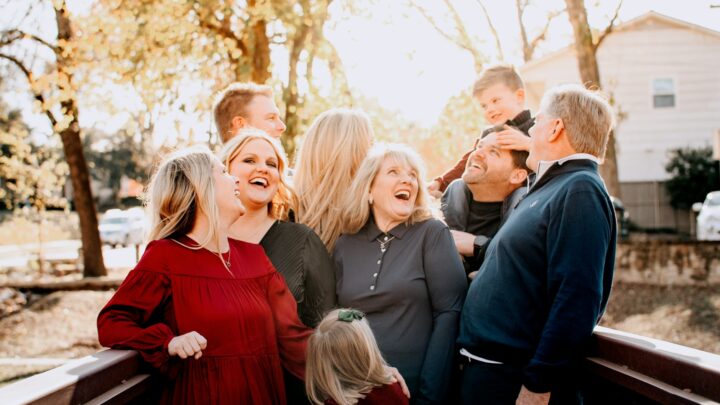It doesn’t matter how confident you are in your relationship—meeting your partner’s parents for the first time brings a whole new kind of nerves.

Even if they seem lovely, it’s normal to overthink everything from what you’re wearing to what you’ll say. You’re not just making a first impression—you’re stepping into a whole family dynamic you haven’t been part of before. Here are some of the most common sources of anxiety that cross pretty much everyone’s mind when they find themselves in this situation. Don’t worry, you’ll do just fine!
1. “What if they don’t like me?”

This is the big one. No matter how chill someone seems, almost everyone wants to be liked by their partner’s family. You don’t have to be best friends right away, but it still stings to imagine a lukewarm reception. The truth is, first impressions matter less than consistency. Even if things feel slightly awkward at first, people often warm up as time goes on, especially when they see how well you treat their son or daughter.
2. “What if I say the wrong thing?”

Small talk suddenly feels like a minefield. You start overthinking every sentence before you say it, wondering if you’ll accidentally bring up a sensitive topic or say something they misinterpret. It helps to remember you’re not expected to carry the entire conversation. Keep it light, ask questions, and don’t be afraid of the occasional silence. Being kind and genuine goes much further than being perfectly articulate.
3. “What if they judge me for my background?”

Whether it’s your job, upbringing, accent, or where you’re from, there’s often a quiet fear that you won’t “fit in” with their expectations. You might worry they’ll size you up before they even get to know you. This anxiety usually speaks more to past experiences than the current situation. And while you can’t control their first assumptions, you can show up grounded in who you are, which is often more disarming than you think.
4. “What if I’m too different from them?”

You might wonder what they talk about at dinner, how formal they are, or whether they’ll get your sense of humour. If they seem more reserved or more outgoing than you, the worry becomes, “Will I stand out in the wrong way?” Differences aren’t dealbreakers—they’re just part of navigating any new relationship. Being yourself, even if it doesn’t match their rhythm right away, can still be the most respectful thing you do.
5. “What should I wear?”

This one might seem surface-level, but it can spiral fast. You want to look like you made an effort—but not like you tried too hard. You want to be comfortable, but still look put-together. Suddenly, your wardrobe feels like it’s betraying you. Go with something that feels like an upgraded version of your usual self. If you wouldn’t wear a blazer to brunch with friends, you don’t need to now. Neat, comfortable, and a notch above casual usually hits the right balance.
6. “What if they talk about stuff I know nothing about?”

There’s always the chance they’ll launch into a conversation about a topic you’re totally unfamiliar with—politics, golf, classic films, obscure wine. And you’ll be left nodding like you understand while hoping you don’t get quizzed. Don’t fake it. Ask questions, show interest, and let yourself be a little out of your depth. People love feeling like the expert, and most will appreciate your curiosity more than if you tried to bluff your way through.
7. “What if they’re too intense about the relationship?”

You might worry they’ll ask heavy questions—where is this going, are you thinking about marriage, what are your long-term plans? That pressure can make the whole visit feel more like an interview than a social occasion. If that happens, it’s okay to give simple, honest answers without oversharing. You don’t need to prove anything in one conversation. A calm, present vibe usually speaks louder than perfect responses.
8. “What if they’re too cold, and I can’t tell where I stand?”

Not all families are overly warm and chatty. Sometimes they’re polite but reserved, and it’s hard to know if they’re just being quiet or if they’re not that into you. That ambiguity can feel more stressful than an obvious bad vibe. Try not to interpret everything right away. Some people take longer to open up, especially if they’re protective of their child. Give it time—second and third meetings often feel totally different.
9. “What if there are cultural or generational gaps?”

Maybe you come from different traditions or family norms, and you’re worried something will get lost in translation. You don’t want to accidentally offend—or feel out of place in a room where everything feels unfamiliar. Approach it with openness and curiosity. If you show respect for their way of doing things while still being yourself, you’re already bridging that gap in a meaningful way.
10. “What if I come off too quiet or too loud?”

Some people worry about being “too much.” Others worry about not being engaging enough. Either way, the fear is the same: will they misread your personality as a red flag instead of just who you are? You don’t have to match their energy perfectly. Just focus on being present. Most families aren’t expecting a performance—they just want to see the person their child cares about acting like themselves.
11. “What if I mess up something small, and it becomes awkward?”

You might obsess over spilling a drink, mispronouncing a name, or saying something that accidentally lands wrong. In your head, one awkward moment could derail the whole thing. In reality, those moments are usually forgettable—unless you make a big deal of them. Laugh it off, apologise if needed, and move on. Most people appreciate someone who can handle a small slip with grace.
12. “What if my partner changes around them?”

Sometimes the biggest curveball is seeing how your partner acts around their family. Maybe they go quiet, get snappy, or suddenly seem different. That change can make you feel like you’ve stepped into unfamiliar territory. Remember that family dynamics run deep, and everyone reverts a little around their parents. It doesn’t mean they’re hiding who they are—it just means they’ve got layers you haven’t seen yet. Pay attention, but don’t panic. You’re still learning each other.




